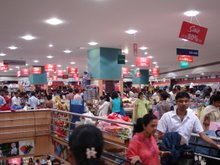PPR picks 27% in Puma for $7b
PPR, the retailer controlled by
PPR, owner of the Gucci Group of luxurygoods brands, paid 330 euros a share in cash for the stake held by German billionaires Guenter and Daniela Herz and will offer the same to other shareholders, Herzogenaurach, Germany-based Puma said. The offer is 16% more than Puma’s closing price on April 4, the day before the shares surged on speculation of a PPR bid.
Buying Puma would give PPR,
“This is a huge acquisition for PPR,” said Clemence Bounaix, an analyst at Paris-based Richelieu Finance. “Puma has a worldwide retail network, something that suits PPR’s strategy. But the price is very high.”
Even Puma has welcomed an intended takeover offer from the French fashion retailer and said that it would recommend the bid to its shareholders. “The Puma board of management unanimously believes that PPR’s engagement is in the best interests of the company and that the announced offer price per share of 330 euros for the voluntary public takeover offer is fair,” Puma said.
“The company has performed quite well on its own in the last few years, and they could have continued that performance,” said Roland Koenen, an analyst at Lampe Bank in
The stock climbed above PPR’s offer price as some analysts said the French company may have to sweeten its bid to convince investors to tender their shares. Puma shares surged as much as 34.55 euros, or 11%, to a record 348.80 euros in
The stock surged 10% on April 5, the steepest gain in four years, after the Wall Street Journal said PPR was in talks with the Herz siblings. PPR shares added 3.16 euros, or 2.5%, to 132.10 euros in
“Puma has become a big brand name again, and the notion of brands is important for PPR,” said Franck Hennin, a fund manager at Richelieu Finance in
Luxury designers are collaborating with sporting-goods makers to capitalise on demand for fashionable apparel and shoes. Puma, known for its leaping-cat logo, and larger rival Adidas AG are working with designers Alexander McQueen and Stella Mc-Cartney, whose companies are owned by PPR.
“It is interesting what you can do with these brands in the area between mass retail and luxury, which are both areas PPR knows well,” Simon Irwin, an analyst at JPMorgan Chase with an “overweight” recommendation on PPR, said by e-mail before the purchase of the stake was unveiled. “The Mc-Cartney collection for Adidas must have given them some ideas.”
Puma has potential to expand in
Adidas, the biggest European sportinggoods maker, has had a contract with Mc-Cartney since 2004. Puma’s products include a range of shoes designed by McQueen and Nuala yoga gear, created with supermodel Christy Turlington.
Adidas bought Reebok International in 2005 for $3.8 billion to help close the sales gap with Nike, the world’s largest sportinggoods maker. The German company paid a 34% premium for Reebok.
Puma and Adidas were formed in the late 1940s after two brothers, Adolf and Rudolf Dassler, clashed over strategy for the shoe company they founded in 1924. “Adi” Dassler attached his name to his company; his brother turned to the wildcat for his own logo. Both companies are based in the same southern German town, about 200 kilometers (125 miles) north of
To keep sales rising, Puma is introducing goods this year including its French 77 line of clothes and shoes, inspired by tennis players of the 1970s such as
The company, whose retail units include the Conforama furniture chain, improved profitability last year for the luxury Yves Saint Laurent, Boucheron and Balenciaga brands as well as the Fnac books and electronics shops.
STEPPING UP
PPR paid 330 euros a share in cash for the stake held by German billionaires Guenter and Daniela Herz
The offer is 16% more than Puma’s closing price on April 4, the day before the shares surged on speculation of a PPR bid
Even Puma has welcomed an intended takeover offer from the French fashion retailer

No comments:
Post a Comment